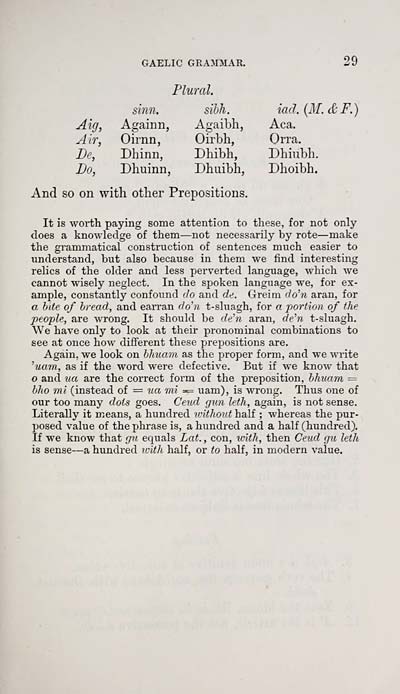Download files
Complete book:
Individual page:
Thumbnail gallery: Grid view | List view

GAELIC GRAMMAR. 29
Plural.
And so on with other Prepositions.
It is worth paying some attention to these, for not only
does a knowledge of them — not necessarily by rote — make
the grammatical construction of sentences much easier to
understand, but also because in them we find interesting
relics of the older and less perverted language, which we
cannot wisely neglect. In the spoken language we, for ex-
ample, constantly confound do and de. Greim do'n aran, for
a Inte of bread, and earran do'n t-sluagh, for a portion of the
people, are wrong. It should be de'yi aran, de^n t-sluagh.
We have only to look at their pronominal combinations to
see at once how different these prepositions are.
Again, we look on hhuam as the proper form, and we write
'nam, as if the word were defective. But if we know that
o and ua are the correct form of the preposition, hhuam =
blio mi (instead of = «« mi = nam), is wrong. Thus one of
our too many dots goes. Ceud gun leth, again, is not sense.
Literally it means, a hundred trithout half ; whereas the pur-
posed value of the phrase is, a hundred and a half (hundred).
If we know that gri equals Lat. , con, ivith, then Ceud gu leth
is sense — a hundred u-ith half, or to half, in modern value.
Plural.
And so on with other Prepositions.
It is worth paying some attention to these, for not only
does a knowledge of them — not necessarily by rote — make
the grammatical construction of sentences much easier to
understand, but also because in them we find interesting
relics of the older and less perverted language, which we
cannot wisely neglect. In the spoken language we, for ex-
ample, constantly confound do and de. Greim do'n aran, for
a Inte of bread, and earran do'n t-sluagh, for a portion of the
people, are wrong. It should be de'yi aran, de^n t-sluagh.
We have only to look at their pronominal combinations to
see at once how different these prepositions are.
Again, we look on hhuam as the proper form, and we write
'nam, as if the word were defective. But if we know that
o and ua are the correct form of the preposition, hhuam =
blio mi (instead of = «« mi = nam), is wrong. Thus one of
our too many dots goes. Ceud gun leth, again, is not sense.
Literally it means, a hundred trithout half ; whereas the pur-
posed value of the phrase is, a hundred and a half (hundred).
If we know that gri equals Lat. , con, ivith, then Ceud gu leth
is sense — a hundred u-ith half, or to half, in modern value.
Set display mode to: Large image | Transcription
Images and transcriptions on this page, including medium image downloads, may be used under the Creative Commons Attribution 4.0 International Licence unless otherwise stated. ![]()
| Early Gaelic Book Collections > Blair Collection > Gaelic texts for schools > (31) |
|---|
| Permanent URL | https://digital.nls.uk/79350755 |
|---|
| Description | A selection of books from a collection of more than 500 titles, mostly on religious and literary topics. Also includes some material dealing with other Celtic languages and societies. Collection created towards the end of the 19th century by Lady Evelyn Stewart Murray. |
|---|
| Description | Selected items from five 'Special and Named Printed Collections'. Includes books in Gaelic and other Celtic languages, works about the Gaels, their languages, literature, culture and history. |
|---|

